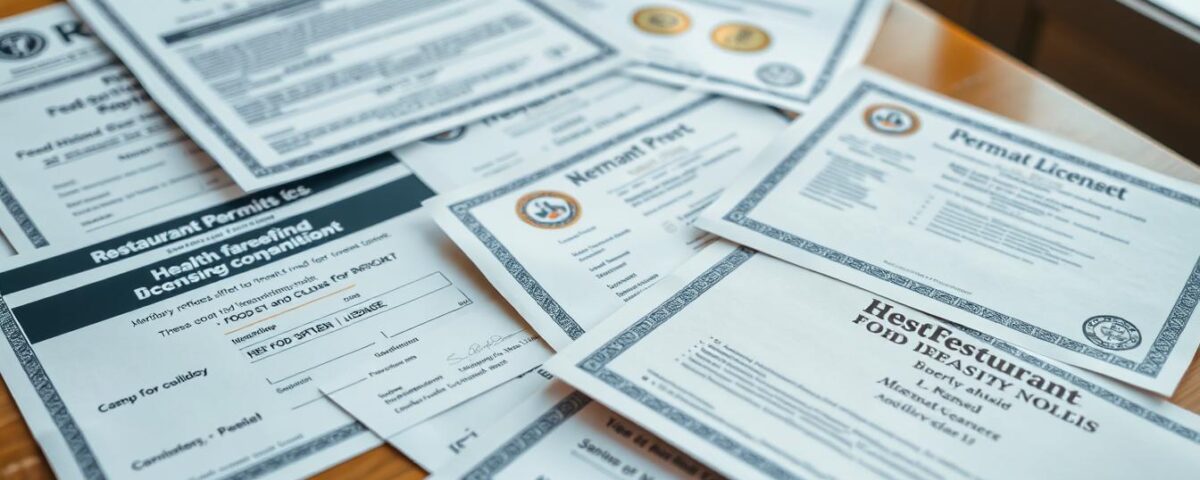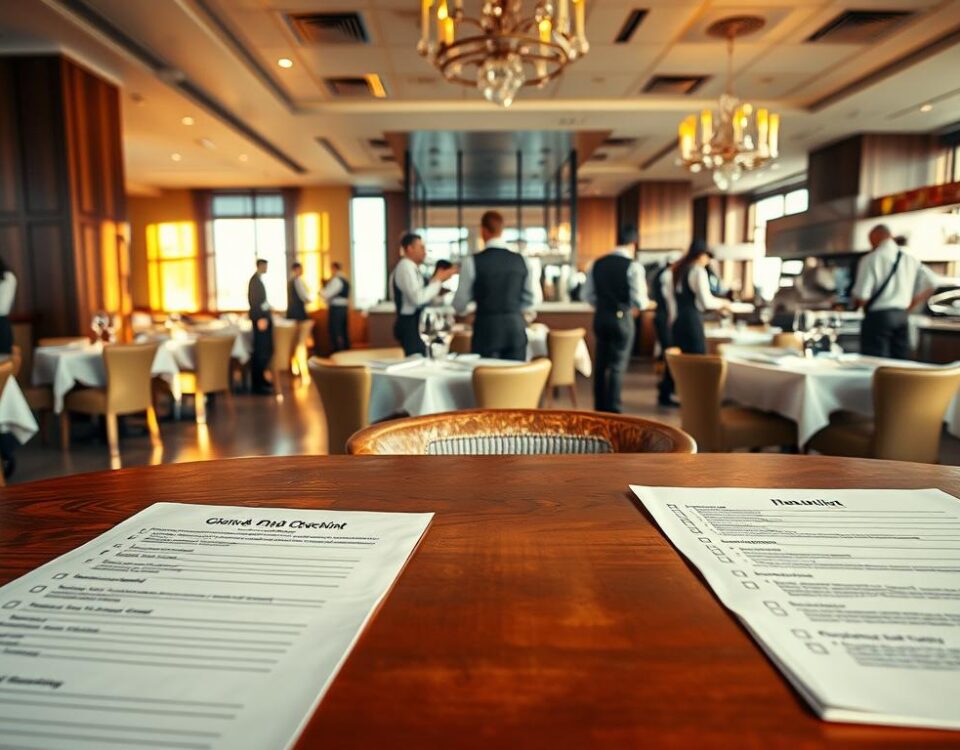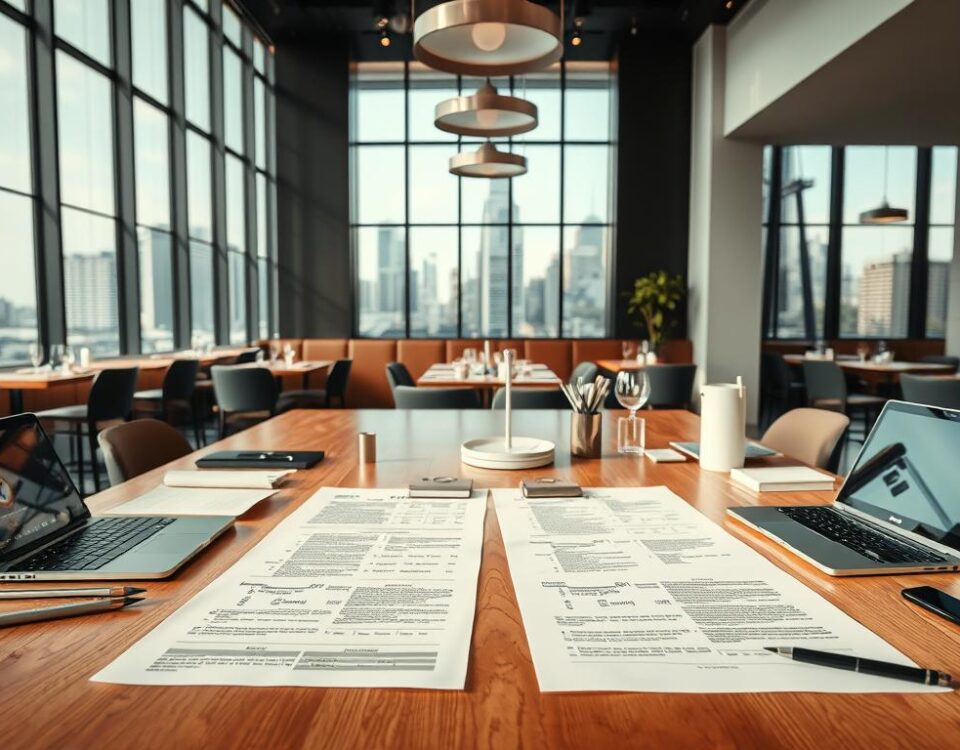
The Ultimate Restaurant Startup Checklist Every New Owner Needs
October 13, 2025
Complete Guide to Restaurant Financing: SBA Loans, Investors, and More
October 14, 2025When I opened my first restaurant, I was overwhelmed by the numerous licenses and permits required to operate legally. The process was daunting, and I faced costly delays due to incomplete documentation.
Did you know that nearly 60% of new business owners face challenges in obtaining the necessary permits and licenses? This can lead to significant financial losses and even business closure. As a food entrepreneur, ensuring compliance with health and safety requirements is crucial.
To avoid these pitfalls, it’s essential to have a comprehensive guide to navigate the complex world of restaurant regulations. This article provides a detailed checklist of the necessary licenses and permits, helping you plan and budget for a successful launch.
Key Takeaways
- Understand the federal, state, and local requirements for your restaurant business.
- Learn how to avoid costly delays and penalties by obtaining necessary permits and licenses on time.
- Get a detailed breakdown of the estimated costs and processing times for each license and permit.
- Discover how to plan and budget for the necessary licenses and permits to ensure a smooth launch.
- Find out how this comprehensive guide can save you time, money, and stress.
Why Restaurant Permits and Licenses Matter
The process of acquiring restaurant permits and licenses is not just about compliance; it’s about building trust with your customers. As a restaurant owner, obtaining the necessary permits and licenses is crucial for demonstrating your commitment to food safety and business ethics.
Legal Compliance and Avoiding Penalties
Having the proper restaurant permits and licenses ensures that your business operates within the bounds of the law, avoiding costly penalties and potential closure. Compliance with health and safety standards is paramount, and the right licenses demonstrate your adherence to these regulations. By prioritizing legal compliance, you protect your business from legal repercussions and reputational damage.
Building Customer Trust and Credibility
Properly displayed permits and licenses signal to customers that your restaurant takes food safety seriously. Today’s consumers are increasingly concerned about food standards and often look for visual cues of compliance when choosing where to dine. By prominently displaying your health department grades and certificates, you can turn these into positive marketing tools. Building a reputation for compliance and safety contributes to long-term customer loyalty and trust. In the age of social media and online reviews, any compliance issues can quickly become public knowledge and damage your restaurant’s reputation.
Planning Your Restaurant Licensing Timeline
To ensure a smooth license application process, it’s essential to plan ahead. As a restaurant owner, understanding the licensing timeline is crucial for a successful launch.
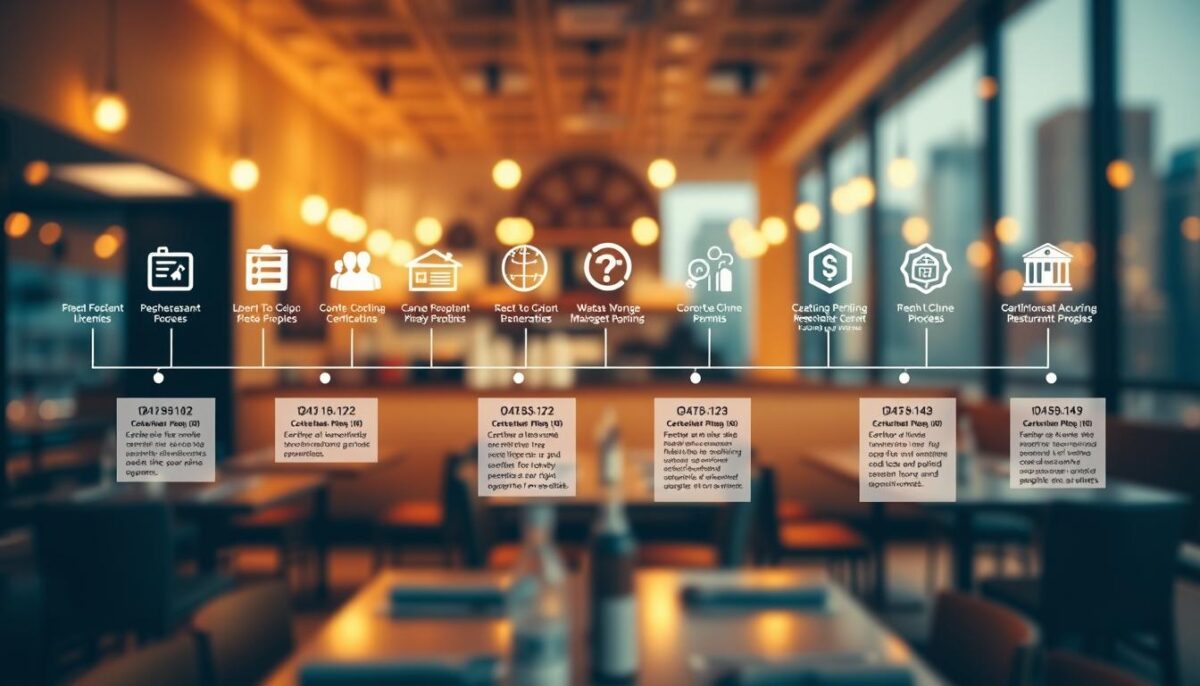
When to Start the Application Process
Starting the application process early is vital. I recommend beginning at least 3-6 months before your planned opening date. This allows sufficient time to navigate the complex license application landscape.
During this period, you’ll need to gather necessary documents, fill out applications, and submit them to the relevant authorities. Being proactive helps avoid last-minute delays that could impact your business launch.
Organizing Your Permit Applications
Effective organization is key to managing multiple permits and licenses. I use a master checklist to track application requirements, submission dates, and renewal deadlines. This helps ensure that I never miss a critical step.
- Create a digital and physical filing system to track progress.
- Set calendar reminders for key dates and renewal deadlines.
- Keep copies of all submitted applications and correspondence.
- Follow up on pending applications without being overly intrusive.
By staying organized and planning ahead, you can ensure a smooth licensing process for your restaurant, setting your business up for success.
Federal Permits and Licenses for Restaurants
To ensure compliance with federal regulations, restaurants must obtain necessary permits and licenses. This step is crucial for the legal operation of a restaurant and involves several key federal requirements.
Employer Identification Number (EIN)
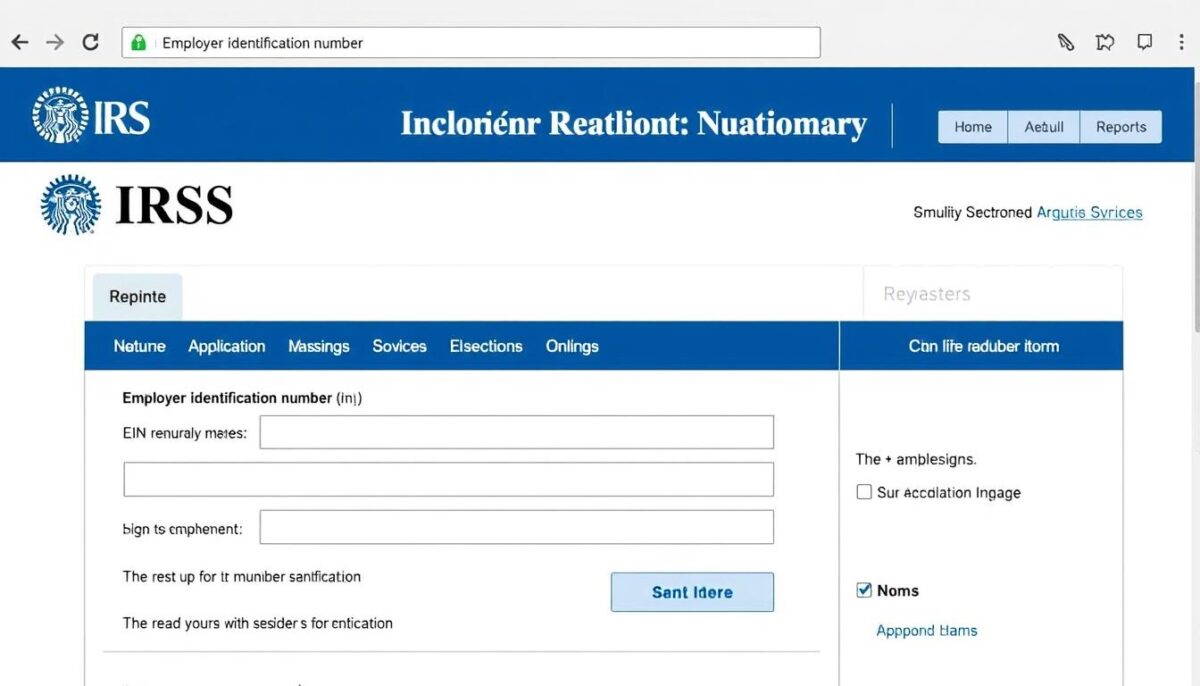
An Employer Identification Number (EIN) is a unique identifier assigned to a business by the IRS. To apply for an EIN for your restaurant, you can submit an online application through the IRS website. This process is straightforward and requires basic information about your business.
The EIN is essential for tax purposes and is used to identify your restaurant on various federal tax returns and other documents. Ensuring you have an EIN is a critical step in setting up your business operations.
FDA Food Facility Registration
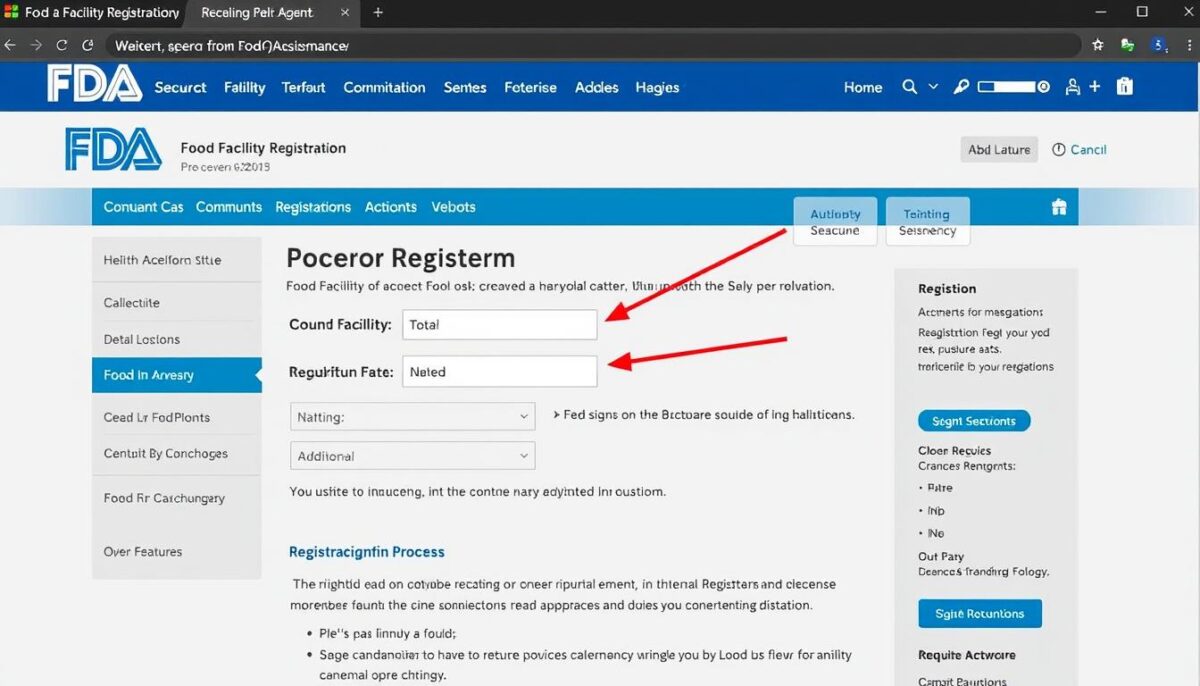
The FDA Food Facility Registration is a requirement for certain food facilities, including those that manufacture, process, pack, or hold food for consumption in the United States. Restaurants that only serve food directly to consumers are generally exempt, but those involved in food manufacturing or packaging need to register.
The online registration process through the FDA’s website requires detailed information about your facility and the food products handled. Registration must be renewed biennially, and it’s crucial to stay compliant with FDA regulations to avoid any penalties.
Understanding the FDA Food Facility Registration requirement is vital for restaurants involved in food production. This registration is part of broader food safety regulations enforced by the FDA to ensure the safety of the food supply.
By obtaining the necessary federal permits and licenses, restaurant owners can ensure they are operating legally and safely. Compliance with federal regulations is a foundational aspect of running a successful restaurant business.
Essential Business Registration Requirements
Registering your restaurant business is a crucial step that lays the foundation for your venture’s success. It’s not just about serving great food; it’s about establishing a legitimate business that complies with all legal requirements.
Business Name Registration
Registering your restaurant’s business name is the first step in establishing your brand identity. To do this, you’ll need to ensure your chosen name isn’t already in use by searching state and local business registries.
The process involves filing for a fictitious business name (DBA – “Doing Business As”) if you’re not using your legal name, and potentially trademarking your name for added protection.
Choosing a Business Structure
Selecting the right business structure is critical for your restaurant’s success. The most common structures are sole proprietorship, partnership, LLC (Limited Liability Company), and corporation.
- Sole Proprietorship: Simple to set up, but offers no personal liability protection.
- Partnership: Suitable for multiple owners, but also lacks personal liability protection unless structured as a limited partnership.
- LLC (Limited Liability Company): Offers a balance between liability protection and operational flexibility, making it a popular choice for independent restaurants.
- Corporation: Provides strong liability protection but is more complex and costly to maintain.
When choosing a business structure, consider factors such as personal liability, taxation, ability to raise capital, and operational complexity. Most independent restaurants opt for an LLC due to its balance of liability protection and operational flexibility.
It’s essential to consult with both an attorney and an accountant to determine the best structure for your restaurant based on your long-term growth plans.
The Complete Restaurant Permits and Licenses Checklist
As a restaurant owner, you’ll need to secure a range of permits and licenses to operate legally and effectively. This checklist is designed to help you navigate the complex regulatory landscape and ensure your business is fully compliant.
Core Permits Every Restaurant Needs
Regardless of the type of restaurant you’re opening, there are certain core permits and licenses that you’ll need to obtain. These include:
- A food service license from your local health department
- A business license from your state or local government
- An Employer Identification Number (EIN) from the IRS
- Compliance with zoning regulations through a certificate of occupancy
These permits are fundamental to operating a restaurant and are typically required regardless of your specific business model. Ensuring you have these in place will provide a solid foundation for your operations.
| Permit/License | Description | Issuing Authority |
|---|---|---|
| Food Service License | Ensures compliance with health and safety standards | Local Health Department |
| Business License | Authorizes your business to operate within a jurisdiction | State or Local Government |
| Employer Identification Number (EIN) | Unique identifier for tax purposes | IRS |
Specialized Permits Based on Restaurant Type
Depending on your restaurant concept, you may need to obtain additional, specialized permits. For instance, if you plan to serve alcohol, you’ll need a liquor license. Restaurants with outdoor seating may require special permits, and those featuring live entertainment will need licenses related to music and performance.
To determine which specialized permits apply to your restaurant, consider the following factors:
- The type of cuisine and service you offer
- Whether you serve alcohol or have a bar
- If you have outdoor seating or other non-traditional service areas
- If you feature live music or other forms of entertainment
Researching local zoning regulations and understanding how they impact your permit requirements is crucial. Certain permits, especially liquor licenses, can significantly affect your timeline and budget. By identifying the necessary permits early on, you can plan more effectively and avoid costly delays.
Business License Requirements
To operate a restaurant legally, you must secure the necessary business licenses, which can vary significantly by location. This section will guide you through the process of obtaining both state and local business licenses.
State Business License
Obtaining a state business license is a fundamental step in legitimizing your restaurant business. The process typically involves submitting an application to your state’s licensing authority, providing required documentation, and paying the necessary fees. For a restaurant business license application, you may need to provide details about your business structure, ownership, and the type of operations you will be conducting.
The specific requirements for a state business license can vary, so it’s essential to check with your state’s licensing department for the most accurate and up-to-date information.
Local Business License
In addition to a state business license, you may also need to obtain a local business license from your city or county. This license ensures that your business complies with local regulations, including zoning laws. Ensuring your restaurant location is properly zoned for food service is crucial, as zoning violations can lead to significant fines or even force you to relocate.
Some municipalities require additional permits beyond the basic business license, such as home occupation permits for ghost kitchens or commissary operations. Building positive relationships with local licensing authorities can facilitate the process and help you navigate any complexities that arise.
Food Service and Health Permits
Food service and health permits are foundational to running a compliant and safe restaurant. These permits ensure that your establishment meets the necessary health and safety standards, protecting both your customers and your business.
Food Service License
A food service license is a critical permit that allows your restaurant to operate legally. To obtain this license, you’ll need to meet specific requirements set by your local health department, which may include:
- Ensuring your kitchen meets health and safety standards
- Passing an initial inspection
- Paying the required licensing fee
Having a food service license not only legitimizes your business but also builds trust with your customers. It’s a testament to your commitment to serving safe and healthy food.
Health Department Permits
Health department permits go beyond the basic food service license, addressing specific aspects of your restaurant’s operations. These may include:
- Grease trap permits to manage waste effectively
- Ventilation system approvals to ensure proper airflow
- Specialized food handling permits for unique menu items
Health departments evaluate restaurant facilities based on critical control points for food safety. Regular inspections and maintaining high standards between official visits are crucial. Building a positive relationship with health inspectors can also help in addressing any violations promptly.
It’s essential to note that health department requirements can vary significantly between jurisdictions. Therefore, researching the specific regulations in your area is vital to ensure compliance.
Building and Zoning Permits
Navigating the complex world of building and zoning permits is a critical step in establishing a successful restaurant.
Before opening your restaurant, it’s essential to understand the various permits required to ensure compliance with local building codes and zoning regulations. Two critical aspects to focus on are obtaining a Certificate of Occupancy and securing Sign Permits and Exterior Modifications.
Certificate of Occupancy
A Certificate of Occupancy is a crucial document that verifies your restaurant complies with local building codes and zoning ordinances, ensuring it’s safe for occupancy.
To obtain a Certificate of Occupancy, you’ll need to undergo an inspection by your local building department. This process involves verifying that your restaurant meets all safety standards, including proper exit signage, fire suppression systems, and compliance with accessibility requirements.

Sign Permits and Exterior Modifications
Sign permits are required for any exterior signage, awnings, or other modifications to your restaurant’s exterior. These permits ensure that your signage complies with local zoning ordinances, historic district regulations, and aesthetic guidelines.
When applying for sign permits, you’ll typically need to submit design renderings, dimensions, and installation details for approval. It’s crucial to work with a sign contractor who is familiar with local regulations to ensure compliance.
Failure to secure the necessary permits for exterior modifications can result in removal orders and fines, even after installation.
In conclusion, understanding and securing the necessary building and zoning permits is vital for the successful launch and operation of your restaurant. By focusing on obtaining a Certificate of Occupancy and complying with sign permits and exterior modification requirements, you can avoid potential legal issues and ensure a smooth operation.
Employee-Related Permits and Certifications
Compliance with employee-related permits and certifications is not just about avoiding penalties; it’s about ensuring a safe dining experience for your customers. As a restaurant owner, it’s crucial to understand the various requirements for your staff.
Food Handler’s Permits
Food handler’s permits are essential for ensuring that all staff members who handle food understand basic food safety principles. These permits typically require completing a training course that covers topics such as proper food handling, storage, and preparation techniques. The food handler’s permit is usually valid for a few years, after which staff members need to renew their certification.
To obtain a food handler’s permit, employees usually need to complete an accredited training program and pass an examination. The specific requirements can vary by jurisdiction, so it’s essential to check with local health authorities.
Manager Food Safety Certification
Beyond basic food handler’s permits, restaurant managers are often required to obtain a more advanced food safety certification. This certification involves comprehensive training that includes HACCP principles, crisis management, regulatory compliance, and staff supervision. Programs like ServSafe Manager or the National Registry of Food Safety Professionals offer recognized certifications.
Having a certified food protection manager on-premises during all hours of operation is a requirement in many jurisdictions. This certification not only ensures compliance but also helps in implementing effective food safety systems in your restaurant, enhancing customer trust and credibility.
Alcohol and Liquor Licenses
The process of acquiring a liquor license is multifaceted and varies significantly by location and restaurant type. As a restaurant owner, understanding the different types of liquor licenses and the application process is crucial for serving alcohol legally and efficiently.
Types of Liquor Licenses for Restaurants
There are several types of liquor licenses that restaurants can apply for, depending on their specific needs. The most common include on-premises licenses, which allow restaurants to serve alcohol for consumption on the premises. Some jurisdictions also offer special licenses for outdoor seating areas or for specific events.
For restaurants that plan to serve a variety of cocktails, a full liquor license is typically required. This license allows for the sale of beer, wine, and spirits. Some states also have different categories for restaurants that primarily serve beer or wine.
Application Process and Timeline
The liquor license application process involves several steps, including background checks, fingerprinting, and public notices. In some cases, community hearings may be required, especially if there are concerns from local residents or businesses.
The timeline for liquor license approval can range from 60 days to over a year, depending on the jurisdiction and the type of license applied for. Potential obstacles in the approval process include neighborhood opposition, zoning issues, or proximity restrictions to schools or churches.
To manage the application process efficiently, it’s advisable to work with experienced attorneys and maintain regular communication with licensing authorities. Starting the application process as early as possible, ideally before signing a lease or beginning construction, is also recommended.
Music, Entertainment, and Copyright Licenses
Music and live entertainment can elevate the dining experience, but they require special licenses and permits. Ensuring you have the right licenses not only enhances your restaurant’s ambiance but also protects you from potential copyright infringement claims.
Music Licensing (ASCAP, BMI, SESAC)
Playing recorded music in your restaurant requires obtaining a music license from performance rights organizations such as ASCAP, BMI, and SESAC. These licenses are essential for complying with copyright laws.
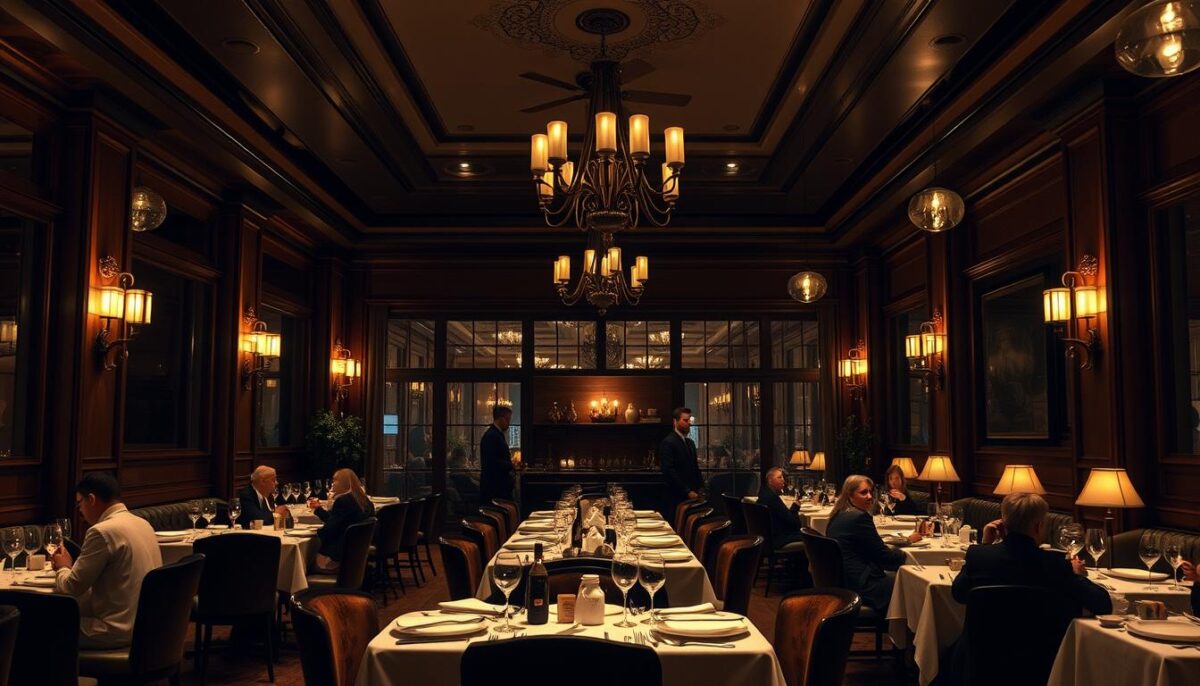
Each of these organizations represents different artists and composers, and having the appropriate licenses ensures that you are legally permitted to play their music. The licensing process typically involves an annual fee based on your restaurant’s size and type.
Live Entertainment Permits
Hosting live entertainment, such as bands or DJs, requires additional permits beyond music licensing. These permits often involve considerations related to zoning regulations, noise ordinances, and sometimes even your liquor license.
Securing live entertainment permits may involve neighborhood notifications, sound level studies, and additional safety inspections. Proper permitting is crucial as unauthorized live entertainment can lead to multiple regulatory violations.
By understanding and obtaining the necessary licenses and permits for music and entertainment, you can create a vibrant atmosphere that complies with all legal requirements, enhancing your restaurant’s appeal and avoiding potential legal issues.
Sales Tax Permits and Resale Certificates
Sales tax permits and resale certificates are two critical components that restaurant owners must understand to comply with state tax laws. As a restaurant owner, you’re required to collect sales tax on the food and beverages you sell, but you can also benefit from exemptions on certain purchases.
Sales Tax Registration
To start, you’ll need to register for a sales tax permit, also known as a sales tax license or resale license, with your state’s tax authority. This permit allows you to collect sales tax from customers and is usually a prerequisite for obtaining other business licenses. The application process typically involves providing your business details, such as your Employer Identification Number (EIN) and business address.
Resale Certificates for Wholesale Purchases
A resale certificate is a document that allows you to purchase ingredients and supplies without paying sales tax, provided they’re intended for resale. To obtain a resale certificate, you’ll typically need to provide your sales tax permit information to your suppliers. It’s essential to keep accurate records of your resale certificate and the purchases made using it, as misuse can result in serious tax penalties.
By understanding and utilizing sales tax permits and resale certificates effectively, you can reduce your upfront costs and maintain compliance with state tax regulations. This not only helps in managing your restaurant’s finances but also in avoiding potential tax pitfalls.
Specialized Permits for Restaurant Operations
The success of your restaurant depends on more than just the menu; it also relies on compliance with local regulations through the right permits. While many restaurant owners are aware of the basic permits required, there are several specialized permits that can impact your business operations. These permits can vary depending on the services you offer and the location of your restaurant.
Dumpster Placement Permits
If your restaurant requires a dumpster for waste disposal, you may need a permit for its placement, especially if it’s on public property or affects local traffic. The process typically involves submitting an application to your local government, specifying the dumpster’s location and duration of stay. Some cities have specific regulations regarding the size and type of dumpster allowed. For instance, you might need to ensure that the dumpster doesn’t obstruct pedestrian paths or roadways. Compliance with these regulations is crucial to avoid fines or having the dumpster removed.
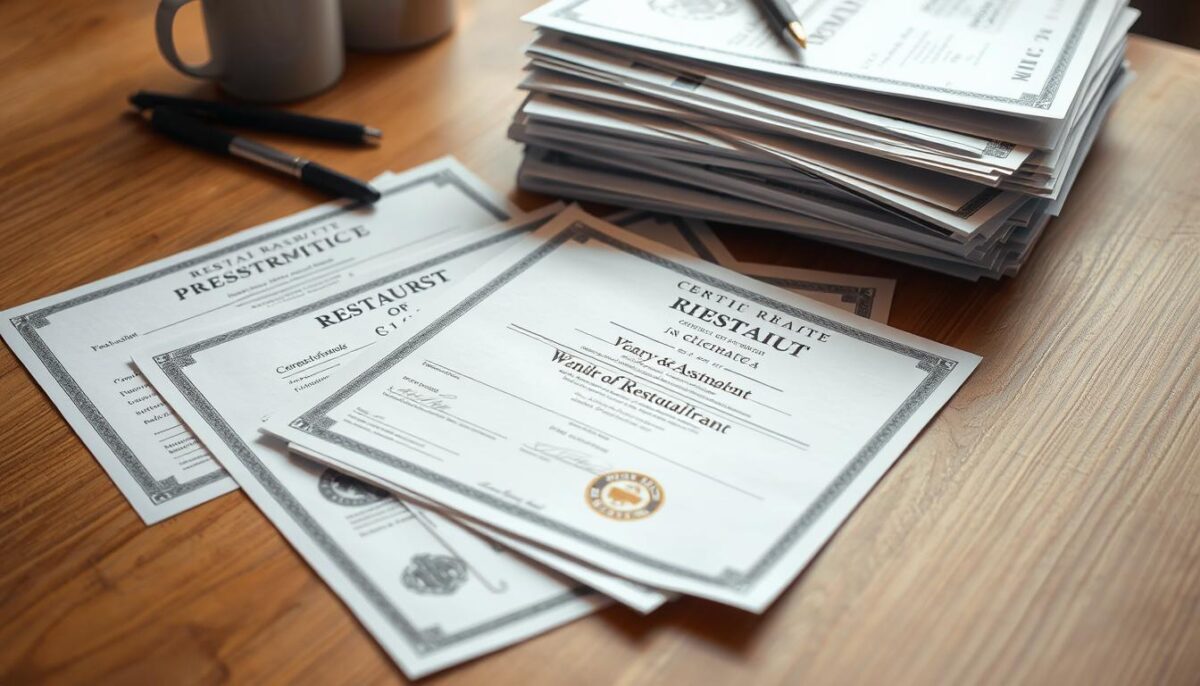
Valet Parking Permits
For restaurants offering valet parking services, additional permits are often required, particularly if you’re using public streets or sidewalks for drop-off and pick-up. The application process for these permits can be complex, involving the submission of traffic flow plans, proof of insurance, and agreements with the owners of the parking facilities. You’ll need to coordinate with local transportation departments, parking authorities, and sometimes business improvement districts. Ensuring compliance with these regulations is vital, as unauthorized valet operations can result in citations, towing of customer vehicles, or liability issues in case of accidents or damage.
Costs and Budgeting for Restaurant Permits and Licenses
Understanding the costs associated with restaurant permits and licenses is crucial for effective budgeting. As a restaurant owner, you need to factor in various expenses to avoid unexpected financial burdens.
Typical Fee Ranges
The fees for restaurant permits and licenses can vary significantly depending on your location and the type of establishment. Here is a general breakdown of typical fee ranges:
| Permit/License | Typical Fee Range |
|---|---|
| Food Service License | $100-$500 |
| Health Department Permit | $200-$1,000 |
| Liquor License | $1,000-$10,000+ |
Budgeting for Renewal Fees
To manage costs effectively, it’s essential to budget for renewal fees. Many permits and licenses require annual renewals, while others may have longer renewal periods. Creating a schedule to track renewal deadlines and allocating funds accordingly can help prevent last-minute financial strain.
Common Challenges and How I Overcame Them
The process of obtaining the necessary permits and licenses for my restaurant was fraught with difficulties, but I learned valuable lessons along the way. From delayed approvals to conflicting regulations, I encountered several unexpected obstacles that tested my resolve.
Dealing with Delayed Approvals
One of the most significant challenges I faced was dealing with delayed approvals from regulatory agencies. To mitigate this, I made sure to submit my applications well in advance of my planned opening date. I also established a system to track the status of my applications and followed up regularly with the relevant authorities. This proactive approach helped minimize delays and ensured that I was prepared for any unexpected holdups.
Navigating Conflicting Requirements
Different regulatory agencies sometimes have conflicting requirements, and navigating these contradictions can be daunting. To overcome this, I facilitated communication between different departments and worked closely with consultants who specialized in restaurant compliance. For instance, I recall a situation where health department regulations conflicted with historical preservation guidelines. By documenting all communications and approvals, I was able to resolve the issue amicably. My experience has shown that working with experts and maintaining clear records is crucial when dealing with complex regulatory challenges.
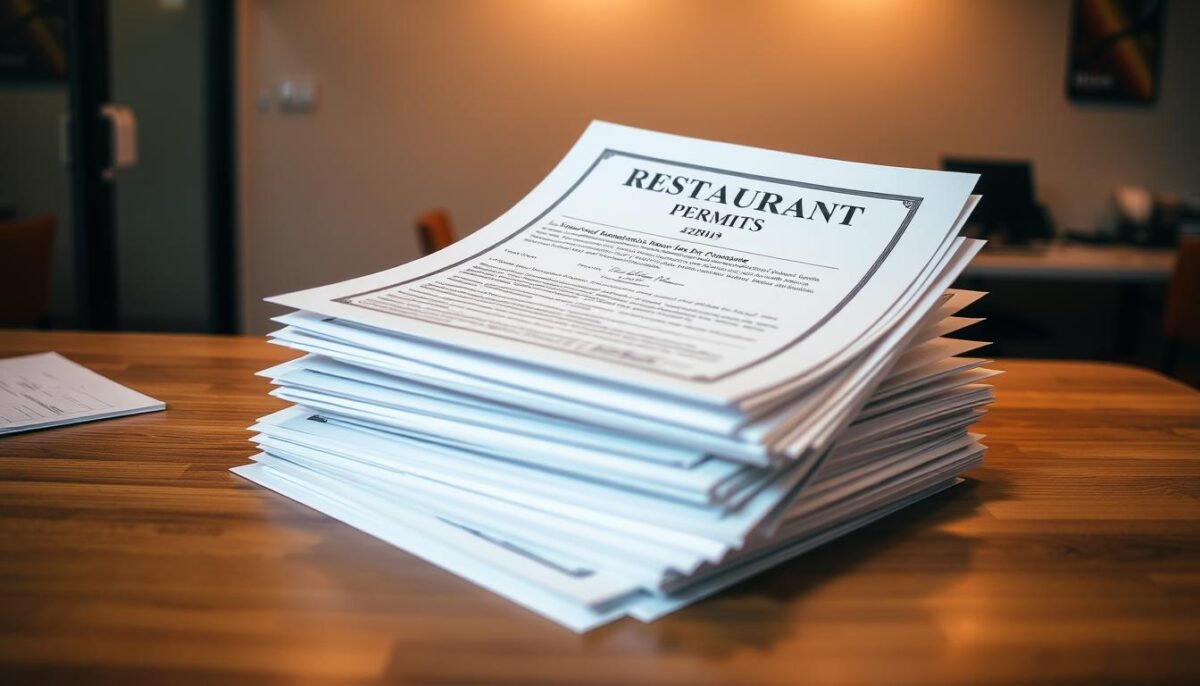
In conclusion, while obtaining permits and licenses for my restaurant presented several challenges, my proactive approach and willingness to seek expert advice helped me overcome these hurdles. By understanding the requirements and regulations upfront, I was able to navigate the process more smoothly.
Conclusion
In conclusion, the process of obtaining restaurant permits and licenses is a vital step in establishing a legitimate and successful food business. This comprehensive guide has outlined the essential licenses and permits required for a restaurant to operate smoothly, from federal to local levels.
Thorough preparation is key to navigating this complex process. By understanding the necessary steps and starting early, restaurant entrepreneurs can avoid delays and ensure compliance with regulations. It’s crucial to use this guide as a starting point and verify the specific requirements with local authorities to ensure a compliant business operation.
Proper permitting not only ensures legal compliance but also contributes to operational excellence and customer confidence. As you embark on your restaurant ownership journey, successfully navigating the permitting process is an important first achievement. With the right licenses and permits in place, you can focus on serving high-quality food and building a loyal customer base.
FAQ
What is an Employer Identification Number (EIN) and why do I need it for my restaurant?
An Employer Identification Number (EIN) is a unique identifier assigned to your business by the IRS. You need it to file taxes, open a bank account, and apply for other licenses and permits.
How do I obtain a food service license for my restaurant?
To obtain a food service license, you’ll need to submit an application to your local health department, meet health and safety standards, and pass a inspection.
What is the difference between a business license and a sales tax permit?
A business license is required to operate a business in a specific state or locality, while a sales tax permit is required to collect and remit sales tax on taxable sales.
Do I need a liquor license to serve beer and wine in my restaurant?
Yes, you’ll need a liquor license to serve beer and wine. The type of license required will depend on the type of beverages you plan to serve and the laws in your state.
How do I ensure my restaurant meets health and safety regulations?
To ensure your restaurant meets health and safety regulations, you’ll need to follow proper food handling and preparation procedures, maintain a clean environment, and pass regular health inspections.
What is a Certificate of Occupancy and why is it necessary for my restaurant?
A Certificate of Occupancy is a document issued by your local government that indicates your restaurant meets building codes and zoning regulations. It’s necessary to ensure your business is operating in a safe and compliant environment.
Can I apply for multiple licenses and permits at the same time?
Yes, you can apply for multiple licenses and permits simultaneously, but be sure to prioritize the most critical ones, such as your food service license and business license.
How long does it take to process a liquor license application?
The processing time for a liquor license application varies by state and locality, but it can take several weeks or even months to receive approval.
What are the costs associated with obtaining and maintaining licenses and permits for my restaurant?
The costs associated with licenses and permits vary by type and jurisdiction, but you can expect to pay fees for initial applications, renewals, and inspections.
